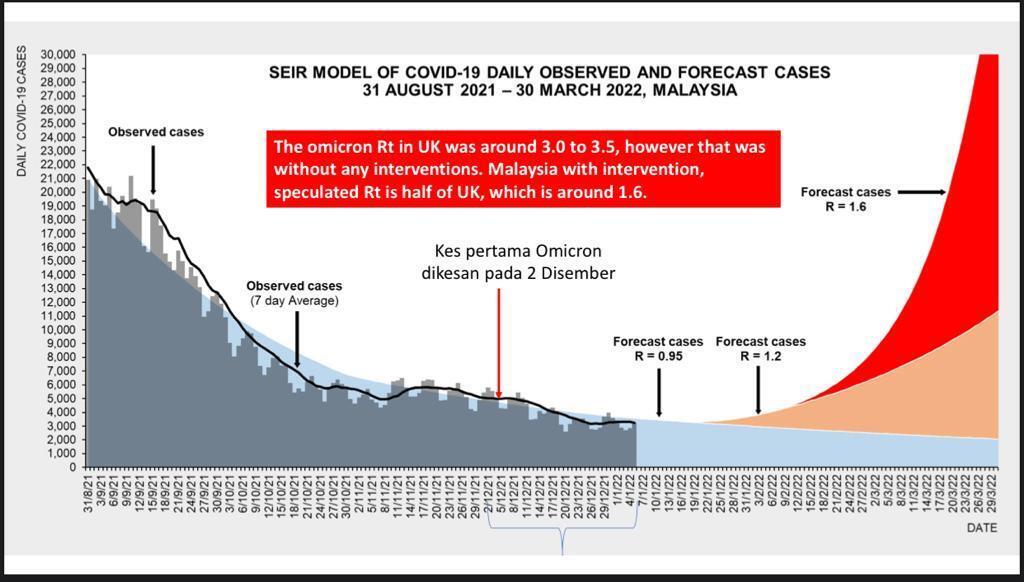KUALA LUMPUR, Jan 6 – Malaysia’s public health officials today released grim projections amid the Omicron variant’s rapid spread that could see the nation’s daily Covid-19 cases climb up to more than 30,000.
According to a modelling done by the Ministry of Health (MOH), Malaysia could face a wave of Covid-19 infections caused by the Omicron variant leading to over 30,000 coronavirus cases a day by the end of March if no new control measures are introduced.
“Our prediction at MOH is if we don’t take preventive actions such as temporary suspension of umrah pilgrimages and issuing quarantine orders, we will see Covid-19 cases spike between January and February this year to about 15,000 cases a day.
“This is the SEIR (Susceptible-Exposed-Infected-Recovered) model of Covid-19 daily observed and forecast cases. If the R-naught (R0) is at 0.95, it will follow the projection in light blue. If the R0 goes up to 1.2, [the number of daily Covid-19 cases] will go up to 10,000.
“If the R0 is at 1.6 — the R0 value in the United Kingdom is 3 at its peak, let’s say ours, we take 50 per cent of that, God forbid — we can expect to report more than 30,000 cases per day,” Health Minister Khairy told a news conference in Parliament today.
Latest available data currently show that Omicron infections are less severe than Delta, however, Khairy said there is still cause for concern if Covid-19 cases rise to more than 30,000 a day, even if they are mostly in Categories One and Two.
“This would mean that hospital admissions will also go up, and our health system has only just recovered,” Khairy said.
The slower number of daily Covid-19 cases reported since November last year has allowed most public and private hospitals to deal with backlog non-Covid cases, as many were deferred due to the coronavirus pandemic the past two years.
As of September 30, 2021, MOH reported a total of 57,355 backlog cases, of which 53,785 or 93.78 per cent were surgical-based and 3,570 or 6.22 per cent were medical-based.
“Backlog here means that these surgeries had to be postponed as most of our hospitals at the time were solely dealing with Covid-19. Normal wards were transformed into Covid-19 wards and these two cannot be mixed because it’s an infectious disease.
“Surgeries could not be carried out because operation theatres were shut down and specialists were assigned to look after Covid-19 cases. So, we’ve just started to see a decline in these backlog cases, and most of them are critical,” Khairy said.
“If we let Omicron run wild, hospital admissions will rise and these backlogs will be deferred again,” Khairy added.
In order to address these backlog cases, the MOH started reopening some operation theatres in stages in October last year. As of October 30, 2021, the number of backlog cases in MOH hospitals was 52,189 (47,828 surgical-based and 4,361 medical-based).
In December 2021, the MOH began conducting Saturday elective surgeries, which runs from 8am to 5pm, at specialist hospitals across the country.
The MOH also plans to implement a mass surgical initiative in several states in February 2022, some of which will be held under the Mass Urological Surgical Initiative at Selayang Hospital and others involving Mass Cataract Surgeries in March 2022 at Tawau Hospital.
Khairy said if preventive measures are not in place to curb Omicron’s rapid spread, frontline health workers will also be affected, as they have to isolate themselves, like what has happened in the United Kingdom, where medical services have been disrupted by the lack of staff, who have been put on quarantine.








